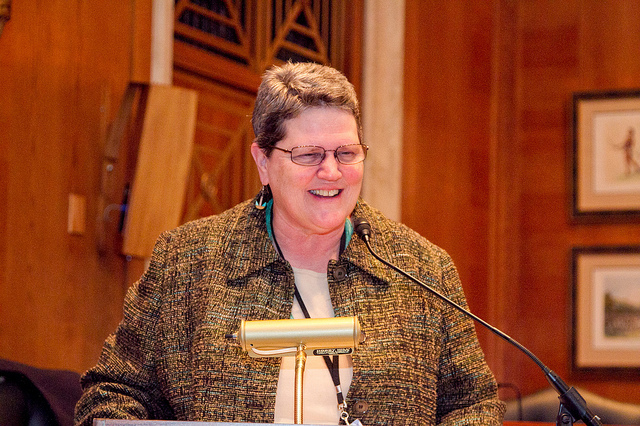 SAMHSA Director Pamela Hyde now will have the GAO Investigating her agency.
SAMHSA Director Pamela Hyde now will have the GAO Investigating her agency.
Rep. Tim Murphy (R-PA), who is both a psychologist and member of Congress, is keeping his promise to continue shining a much needed spotlight on our nation’s problem-plagued mental health care system. Late last week, Rep. Diana DeGette (D-Co.), joined him in asking the General Accountability Office to investigate how the U.S. government delivers mental health services to the public and whether the Substance Abuse and Mental Health Services Administration (SAMHSA) is doing a responsible job in allocating the $3.6 billion each year that it spends.
Reps. Murphy and DeGette deserve big KUDOS for continuing to make mental health reform a priority — especially since their counterparts in the Senate and other members of the House appear to have put mental health on a back burner while they chase after more recent scandals (IRS and privacy concerns) that are more likely to get them on the national news.
Have they forgotten Sandy Hook and all of the promises that were made about improving our mental health system?
Rep. Murphy chairs the Energy and Commerce Oversight and Investigations subcommittee and Rep. DeGette is its ranking Democrat member. Under their bipartisan leadership, the subcommittee already has held a public forum and two hearings about mental health care — all prompted by the Newtown shootings. The same question was asked at each hearing. Is the federal government meeting the needs of the sickest of the sick?
The answer has been and continues to be an loud NO.
I testified at the subcommitee’s first forum, along with Pat Milam, about roadblocks parents face when trying to get decent mental health care for their loved ones. The subcommittee’s second hearing examined how federal privacy laws (HIPAA) actually have harmed patient care and public safety, and the third subcommittee hearing investigated SAMHSA, which is the federal government’s main deliverer of mental health care programs.
Dr. E. Fuller Torrey, a long time SAMHSA critic, lead the charge at the third hearing by documenting how SAMHSA focuses on curbing drug and alcohol abuse more than it does on delivering mental health care services. The money that SAMHSA does spend often goes for programs that are not aimed at helping the serious mentally ill. At the hearing, Rep. Murphy warned a clearly unprepared Pamela Hyde, SAMHSA’s director, that his subcommittee intended to continue digging into her agency’s practices. She appeared to be completely unconcerned.
Perhaps now that the subcommittee is sending in GAO watchdogs, she will pay attention.
The subcommittee has send the GAO two requests. In the first, it asks if the different government agencies that deal with mental health care are sharing information and coordinating their efforts to help “individuals with serious mental illnesses.” SMIs, as they are known, include bipolar disorder, severe depression and schizophrenia.
The subcommittee’s second request asks the GAO to determine how much of the $1 billion that is being dispensed by SAMHSA for mental health care actually is spent to help the seriously mentally ill.
Getting the GAO to investigate and expose problems in the federal system will generate useful headlines which sould alarm the public. With continued prodding from members of the subcommittee, improvements might actually be made.
Let’s hope so.




Our son was diagnosed as bipolar in 2007. Since then, he has had to be hospitalized at the state hospital twice for mania, first in 2007, and in 2010. It is an ordeal to get him into the state hospital here in Texas. The last time he was there, they helped him apply for disability, and last summer he qualified for medicare.
Last fall, when he realized another manic episode was beginning, he wanted to go to the hospital, and was told that medicare would pay for a private facility. The hospital admitted him immediately, changed his medication, and discharged him after 10 days, even though he was not stable, because ‘medicare doesn’t like it for patients to stay longer.’ They told him that the $1100 co-pay would cover anything he needed for the next 3 months, but when he tried to get re-admitted in crisis after only a couple of days, he was turned away because they ‘had no beds.’ He was severely depressed for months, until his doctor changed him back to a medication that had been working before the episode.
The exact same thing happened in May of this year, only with a different private hospital. Since the most recent hospitalization and discharge on a new medication (this time he was more psychotic when he was discharged than when he went into the hospital), he has been in jail and has run away from home, ending up in an ICU unit in another state, where he left AMA, and then my family in yet another state had to have him picked up by the police, where he was committed to their state hospital, and is at present.
All this waste of taxpayers’ money, and the time and energy of many people, because when he asked for help, the hospital that took money from medicare and from our son’s disability check failed to help him!!
I wish I knew where to tell our story that it would actually make a difference! I don’t know where to begin, but the facts are that in the past, the state hospital has been the only place where our son has gotten real help.
While private facilities are building new buildings, the state hospital has a large number of buildings which are empty and in need of staffing and repair, but insufficient funding.